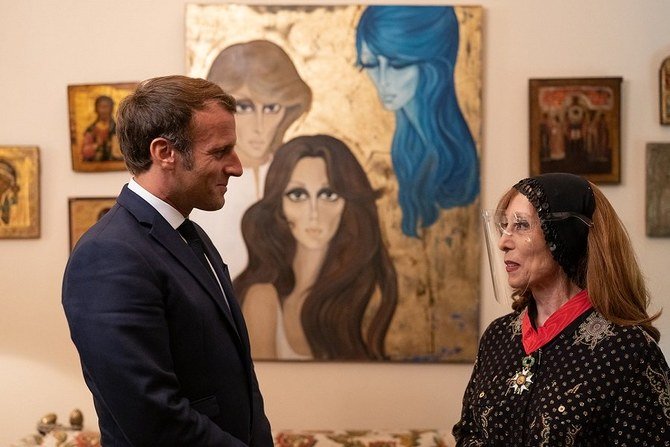
- ARAB NEWS
- 18 Jul 2025

Faisal Abbas, the editor in chief of this newspaper, this week wrote an article saying that the French President Emmanuel Macron had made a “faux pas” on Lebanon despite his “good intentions.” I believe Macron did not make a faux pas, but rather made the right step to take the country in the wrong direction. He knew exactly what he was doing and his efforts were not driven by good intentions as much as by a desire to score political points. Internationally, he hopes his role in Lebanon will give him the opportunity to play a larger role, namely as the mediator between Iran and the US; while domestically it will help him bump up his plummeting popularity, which was highlighted by the recent municipal election results.
His second trip to Lebanon as the savior of the country this week debuted with a visit to Fairuz, the diva the Lebanese adore and who represents everything they love about their country. He said during his visit that Hezbollah is representative of a faction of the Lebanese society, but nevertheless he declared that he plans to “educate” the group about its “responsibilities.” Hezbollah needs no education, Mr. President, it knows exactly what it is doing and is fully aware of the dangers it is dragging the country into. Macron’s initiative, sugar-coated with the buzz phrase “unity government,” is a maneuver to reach out to Hezbollah and give it legitimacy internationally.
To understand Macron’s position on Hezbollah, it is important to analyze his attitude toward Iran. If we look at his track record, we can see his relentless efforts to cozy up to Tehran and to play the role of mediator between it and the US. He tried, during the UN summit in September last year, to broker a meeting between Donald Trump and Hassan Rouhani. The latter refused to meet, insisting on a precondition that the Americans ease their sanctions on the Islamic Republic. A month earlier, he had tried to link Trump up with Iranian Foreign Minister Mohammed Javad Zarif during the G7 summit in Biarritz, France.
When the Beirut port explosion happened on Aug. 4, he was the first leader to rush to Lebanon and express solidarity with its people. He walked among the people in the badly affected areas. Following his trip, he called on Trump to ease sanctions on Hezbollah, using as a pretext that they play into the hands of Iran. However, France’s choice of ambassador for Lebanon — Bruno Foucher, who is Paris’ former ambassador to Tehran — shows that, even before the blast, its policy toward Lebanon entailed engagement with Hezbollah as part of an overall policy of engaging with Iran.
The Lebanese should not accept Macron’s regional policy being drafted at their expense.
Though Macron urged the Lebanese, with a very patronizing tone, to create a non-confessional Senate, his policy for Lebanon is drafted from a sectarian prism. He told Saad Hariri to forget about the premiership and asked him, along with other former prime ministers, to give a few names that could be accepted from the other side. Among the nominees was Mustapha Adib, the new designated prime minister. While Parliament Speaker Nabih Berri and Hezbollah had no preference, the Free Patriotic Movement headed by Gebran Bassil chose Adib.
Adib is an obscure personality who used to work as an adviser for former Prime Minister Najib Mikati and was named ambassador to Germany with no major achievements. Basically, he is a clone of Hassan Diab — a prime minister with no flavor who can act as a cover for the current corrupt elite. The worst part of this nomination is that it embodies the fact that the prime minister is the nominee of the Sunni club, basically emphasizing sectarianism. Not only has Macron allowed Hezbollah a new front, he was also able to affiliate this premiership to the Sunni camp. Therefore, Hezbollah will be acquitted of any blunders the next government is likely to make, as they will be tagged to the Hariri camp, unlike the previous one, which was labeled as Hezbollah’s government.
The nomination of a prime minister, which had to happen before Macron landed in Lebanon, was a stunt with no substance behind it. The nomination did not come with a plan to cater to the Lebanese people’s demands, such as holding early elections, setting concrete steps toward reforms or enforcing transparency and accountability.
During Macron’s last visit, his show of compassion in Gemmayze was coupled with a patronizing attitude toward members of Lebanon’s civil society, as he told them they are not yet ready to replace the current parties. The result of his maneuver is a good wake-up call to the Lebanese, who should not rely on some foreign country or an international “superman” to save the day; they have to take their fate into their own hands.
Macron looks at Lebanon from the angle of how it fits into the regional context. For him, it is a gateway to reach Iran. His previous attempts to push the Iranians to meet with the US were rebuffed, as they wanted some concessions in return for answering his calls. Giving legitimacy to Hezbollah internationally — under the guise of a unity government — can be the concession that would allow Macron to push Iran to enter into dialogue with the US.
Now that France is involved in a confrontational relationship with Turkey, Lebanon is another battleground in Macron’s regional competition, especially as Hezbollah has been propagating news about a Turkish intervention in the north of Lebanon as a type of diversion from the current situation. Macron is free to pursue his own regional policy, but the Lebanese should not accept this policy being drafted at their expense. Hopefully the Lebanese can now see that Macron’s visit will not lead to any progress and its only achievement was perhaps to put a smile on the face of Fairuz.